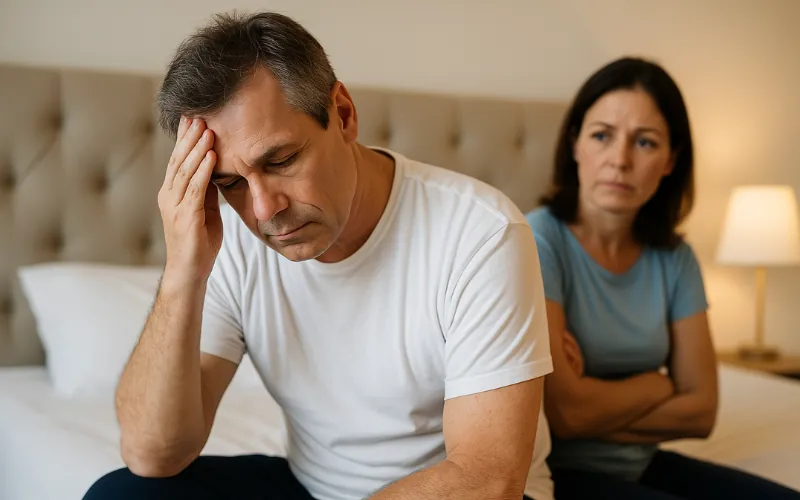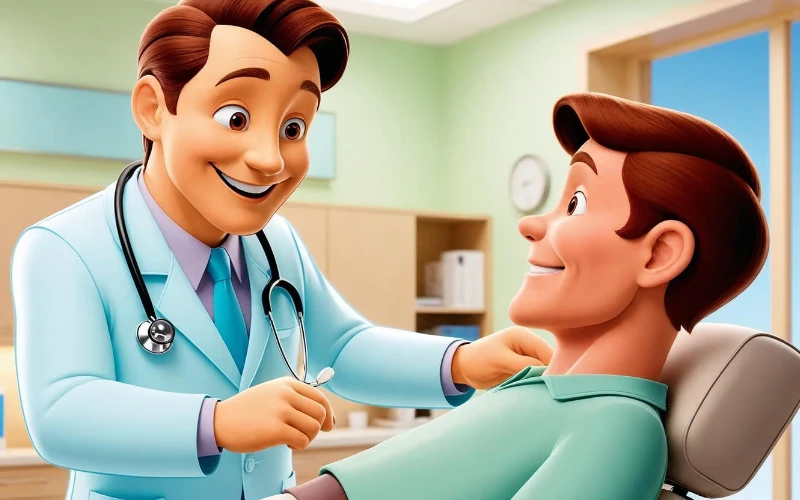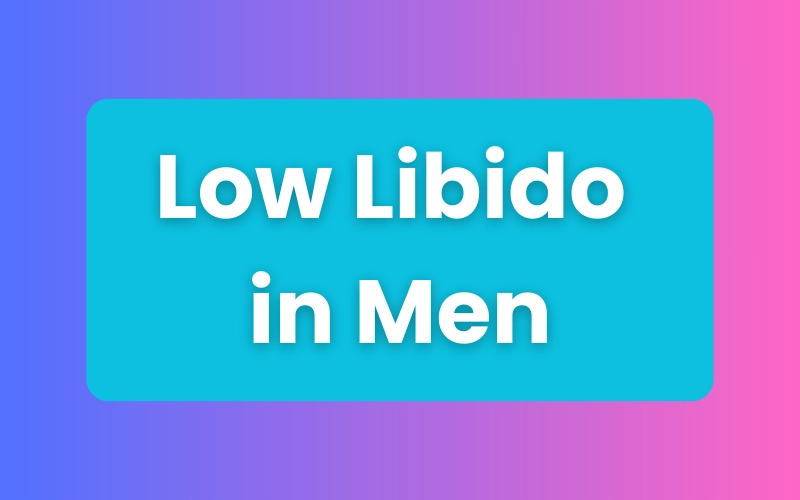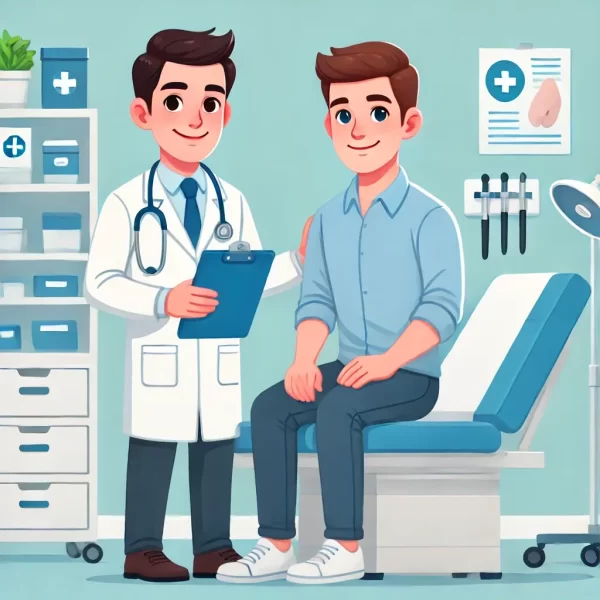Low libido, or reduced sexual desire, is a common but often overlooked issue affecting many men at different stages of life. While occasional fluctuations in sex drive are normal, a persistent lack of interest in sexual activity may signal an underlying medical, psychological, or lifestyle-related problem.
This article explores the causes, symptoms, and effective solutions for low libido in men — empowering you with knowledge and practical steps to restore sexual health and confidence.
What Is Low Libido in Men?
Low libido in men refers to a reduced interest in sexual activity, including a lack of desire for sexual intercourse, masturbation, or sexual thoughts and fantasies. While it’s normal for sex drive to fluctuate over time, persistent or long-term low libido may indicate an underlying issue—whether physical, psychological, hormonal, or relational.
Sexual desire is influenced by a complex interplay of factors including hormone levels (especially testosterone), emotional health, stress, lifestyle, and relationship satisfaction. When one or more of these factors are out of balance, it can lead to a noticeable decrease in sexual interest.
It’s important to distinguish low libido from erectile dysfunction (ED).
Low libido is a lack of desire or interest in sex.
ED is the inability to achieve or maintain an erection, often despite having sexual desire.
Though they can occur together, they are distinct conditions requiring different treatment approaches.
Low libido isn’t just a sexual issue—it can affect a man’s self-confidence, emotional wellbeing, and intimate relationships. Fortunately, it’s also highly treatable, especially when the root cause is properly identified.
How Common Is Low Libido?
Low libido is more common than many men realize. While occasional dips in sexual desire are normal and often influenced by stress, fatigue, or life changes, persistent low libido affects a significant portion of men—especially as they age.
📊 Prevalence:
Around 15% to 25% of men report problems with low sexual desire at some point in their lives.
It becomes increasingly common after the age of 40, often associated with hormonal changes or chronic health conditions.
However, younger men are not immune. Low libido can also occur in men in their 20s and 30s, particularly when psychological stress, poor lifestyle habits, or emotional factors are present.
💡 Key Insight:
Low libido is often underreported because many men feel embarrassed to talk about it. As a result, they delay seeking help or assume it’s a “normal” part of aging. But in reality, low libido is not inevitable and should never be ignored—especially when it begins to impact one’s quality of life or relationships.
Common Symptoms of Low Libido
Low libido doesn’t always mean a complete lack of interest in sex—it can present in a variety of ways, depending on the individual’s physical health, emotional state, and relationship dynamics.

🔍 Typical Signs Include:
Reduced interest in sexual activity over an extended period (weeks or months)
Fewer sexual thoughts or fantasies than usual
Lack of initiation of sexual encounters with a partner
Avoidance of intimacy, including cuddling or kissing
Difficulty feeling aroused, even in stimulating situations
Emotional disconnection during sex or loss of satisfaction
Tension or frustration in relationships due to sexual avoidance
🧠 Emotional & Psychological Indicators:
Feeling indifferent or emotionally flat toward sex
Guilt or shame about having little or no desire
Anxiety about not meeting a partner’s needs
Declining self-esteem or body image issues
📌 Note: A temporary drop in libido is normal—especially during times of stress or illness. However, when low desire persists and begins to affect daily life or relationships, it may indicate an underlying issue that needs to be addressed.
What Causes Low Libido in Men?
Low libido can stem from a wide range of factors—physical, psychological, hormonal, or lifestyle-related. Often, it’s the result of a combination of several influences, making proper evaluation essential for effective treatment.
1. Hormonal Imbalances
Low testosterone (hypogonadism) – the most well-known hormonal cause. Testosterone plays a key role in libido, and declining levels (especially after age 30) can reduce sexual desire.
Thyroid disorders – both hyperthyroidism and hypothyroidism can disrupt libido.
Elevated prolactin or estrogen – may inhibit testosterone production and sexual interest.
2. Chronic Illness and Medical Conditions
Diabetes – especially when poorly controlled, it can damage nerves and blood vessels and reduce sexual function.
Obesity – associated with lower testosterone and body image concerns.
Sleep apnea – leads to fatigue and hormone imbalance.
Chronic pain or fatigue syndromes – may reduce interest or ability to engage in sex.
3. Psychological Causes
Depression – one of the leading psychological causes of low libido.
Anxiety and stress – interfere with focus, mood, and arousal.
Past trauma – sexual or emotional trauma can lead to avoidance.
Relationship conflict – poor communication, resentment, or emotional disconnection affects intimacy.
4. Medications and Substance Use
Antidepressants (especially SSRIs) – commonly reported to suppress libido.
Blood pressure medications – beta-blockers, in particular, may reduce sexual desire.
Recreational drug use – cannabis, opioids, and alcohol can interfere with hormones and arousal signals.
5. Lifestyle Factors
Lack of physical activity – leads to lower testosterone and poor circulation.
Poor diet – processed foods and sugar can disrupt hormones and energy.
Smoking and excessive alcohol – both negatively affect libido and overall health.
Sleep deprivation – lowers testosterone and increases stress hormones like cortisol.
💡 Insight: Libido is sensitive to a person’s overall health and well-being. Treating the root causes—whether hormonal, emotional, or lifestyle-related—can often restore sexual desire naturally.
Risk Factors for Low Libido in Men
While any man can experience low sexual desire at some point, certain factors increase the likelihood of persistent or chronic low libido. Identifying these risk factors is essential for prevention and early intervention.
1. Age
Testosterone levels naturally decline with age—starting as early as the 30s.
Older men are more likely to experience hormonal imbalance, chronic illnesses, and medication use—all of which can affect libido.
2. Chronic Medical Conditions
Diabetes – impacts hormone production and nerve sensitivity.
Heart disease – affects blood flow, which is linked to arousal.
Obesity – associated with low testosterone and low self-esteem.
Sleep disorders – disrupt hormone cycles and increase fatigue.
Chronic pain conditions – reduce energy, focus, and desire for intimacy.
3. Mental Health Disorders
Depression – directly reduces sexual interest and energy.
Anxiety – including performance anxiety, interferes with desire.
High stress levels – chronic stress increases cortisol and lowers testosterone.
4. Substance Use
Alcohol abuse – long-term use reduces testosterone and damages sexual function.
Smoking – impairs blood flow and may affect hormone balance.
Recreational drugs – such as opioids or cannabis can blunt desire and lower testosterone.
5. Certain Medications
SSRIs and other antidepressants – among the most common libido-reducing drugs.
Blood pressure medications – particularly beta-blockers.
Hormonal therapies or steroids – can disrupt the body’s natural hormone regulation.
6. Lifestyle Habits
Poor diet – nutrient deficiencies and high sugar intake impact testosterone production.
Sedentary behavior – linked to lower testosterone and reduced energy levels.
Lack of sleep – negatively affects testosterone and mood regulation.
✅ Tip: Addressing modifiable risk factors—such as diet, stress, and sleep—can often make a significant difference in improving sexual desire without the need for medication.
Psychological Impact of Low Libido
Low libido isn’t just a physical concern—it can also lead to significant emotional and psychological challenges. The experience of reduced sexual desire often triggers a cascade of mental and relational effects that can worsen the condition if not properly addressed.
1. Decreased Self-Esteem
Men often associate their masculinity and identity with sexual performance.
A persistent lack of desire may lead to feelings of inadequacy or failure.
2. Relationship Strain
Intimacy is a crucial part of many romantic relationships.
When one partner consistently lacks sexual interest, it may lead to:
Misunderstandings
Feelings of rejection or neglect
Reduced emotional connection
3. Emotional Distress
Men with low libido frequently report symptoms of:
Anxiety
Irritability
Sadness or depression
The condition can become a source of chronic frustration and guilt, especially if the partner is not aware of the underlying issue.
4. Avoidance Behavior
Some men may avoid situations that could lead to intimacy or sexual expectations.
This can include:
Avoiding physical touch or affection
Making excuses to avoid going to bed with a partner
Becoming emotionally distant
5. Negative Feedback Loop
Low libido → Relationship issues → Increased stress and anxiety → Further decreased libido.
This cycle can perpetuate itself unless properly interrupted with emotional support or therapy.
💡 Insight: Many men suffer in silence due to embarrassment or societal expectations around male sexuality. Open communication and professional counseling can help reduce this burden and rebuild confidence.
How Is Low Libido Diagnosed?
Diagnosing low libido involves more than simply acknowledging a reduced interest in sex. Because libido is influenced by physical, psychological, hormonal, and relationship factors, a thorough evaluation is essential to identify the root cause and recommend effective treatment.
1. Medical History Review
A healthcare provider will begin by asking detailed questions about:
When the loss of libido started
Whether it’s consistent or fluctuates
If it affects all situations or only specific partners
Current medications (e.g., antidepressants, antihypertensives)
Existing medical conditions (e.g., diabetes, hypothyroidism, depression)
Sleep quality and daily energy levels
✅ Why it matters: This helps rule out underlying physical or hormonal causes.
2. Physical Examination
The doctor may perform a basic physical exam to check for signs such as:
Testicular abnormalities
Obesity or metabolic syndrome
Signs of low testosterone (e.g., reduced muscle mass, body hair loss)
Breast enlargement (gynecomastia)
3. Hormonal Blood Tests
Hormones play a key role in sexual desire. Common lab tests may include:
Total testosterone (ideally measured in the morning)
Free testosterone
Prolactin (elevated levels can reduce libido)
Thyroid hormones (TSH, T3, T4)
Estrogen levels (especially if symptoms suggest hormonal imbalance)
4. Mental Health Evaluation
Since psychological factors are a common cause of low libido, a mental health assessment may be recommended. This can help identify:
Depression
Anxiety
Chronic stress
Past trauma or relationship issues
🧠 Insight: Even if the cause is physical, psychological effects often follow, so addressing mental health is crucial.
5. Relationship and Lifestyle Assessment
Quality of current relationships
Stress levels at work or home
Sleep patterns and physical activity
Substance use (alcohol, tobacco, recreational drugs)
6. Partner Involvement (Optional but Helpful)
Involving the sexual partner in the assessment can provide context and insight into how the issue is affecting the relationship, and it opens the door for cooperative treatment strategies.
📌 Note: There is no single “test” for low libido—it’s a diagnosis based on a combination of self-reported symptoms, physical findings, and lab results.
Treatment Options for Low Libido in Men
Low libido can often be improved or fully restored with proper treatment. The best approach depends on the underlying cause—whether it’s hormonal, psychological, lifestyle-related, or due to a chronic health condition. Below are the most effective, evidence-based treatment strategies:

1. Testosterone Replacement Therapy (TRT)
If blood tests show low testosterone levels (hypogonadism), TRT may be recommended.
Benefits:
Improves libido and sexual satisfaction
Increases energy and mood
Enhances muscle mass and bone density
Delivery methods:
Gels or creams (applied daily)
Injections (every 1–2 weeks)
Patches (worn daily)
Important: TRT is only for men with confirmed low testosterone. Overuse can lead to infertility, heart problems, and prostate issues.
2. Psychological Counseling or Sex Therapy
When stress, anxiety, depression, or unresolved trauma is involved, therapy can be highly effective.
Options include:
Cognitive Behavioral Therapy (CBT) – addresses negative thought patterns and sexual anxiety
Couples therapy – improves communication and intimacy
Sex therapy – helps address performance anxiety, low desire, or emotional disconnect
🧠 Therapy is particularly helpful when libido loss is related to relationship conflict or emotional stress.
3. Lifestyle Modifications
Improving daily habits can naturally boost sexual desire over time:
| Habit Change | Impact on Libido |
|---|---|
| Regular exercise | Boosts testosterone, mood, and blood flow |
| Healthy diet | Supports hormone production and vascular health |
| Better sleep | Increases testosterone and improves mood |
| Reduce alcohol | Excessive use lowers testosterone |
| Quit smoking | Enhances circulation and overall sexual function |
4. Treating Underlying Health Conditions
Medical issues such as diabetes, hypertension, obesity, and thyroid dysfunction can suppress libido. Addressing these conditions through medications, diet, and exercise can restore sexual desire.
Example:
Diabetes management → improves nerve and blood vessel function
Thyroid treatment → corrects hormonal imbalances affecting libido
5. Adjusting Medications
Certain drugs, especially SSRIs (antidepressants), blood pressure medications, and opioids, can reduce libido. A doctor may:
Lower the dose
Switch to an alternative drug
Add a medication to counteract side effects (e.g., bupropion)
⚠️ Never stop or change medications without professional guidance.
6. Natural Supplements (Use With Caution)
Some supplements may help, especially when combined with healthy habits:
| Supplement | Possible Benefit |
|---|---|
| L-Arginine | Boosts nitric oxide → improves blood flow |
| Maca Root | Traditionally used to enhance libido |
| Ashwagandha | May reduce stress and support testosterone |
| Zinc & Vitamin D | Help regulate testosterone levels |
✅ Talk to a healthcare provider before starting any supplement—some may interfere with medications or be ineffective.
Behavioral and Relationship-Based Approaches to Boost Libido
Not all solutions for low libido require medication or medical intervention. In many cases, changes in behavior, communication, and emotional connection can play a powerful role in restoring sexual desire.
1. Enhancing Emotional Intimacy
Sometimes, low libido stems from emotional distance rather than physical dysfunction. Rebuilding emotional intimacy can reignite passion.
Helpful strategies:
Spend quality time together without distractions
Share feelings openly and honestly
Engage in non-sexual touch (hugging, cuddling, holding hands)
Practice active listening and appreciation
💬 A strong emotional bond often leads to a stronger physical connection.
2. Reducing Performance Pressure
When sex becomes a performance, desire can take a backseat. Many men with low libido feel anxious about their ability to satisfy their partner.
What helps:
Shift focus from performance to connection
Emphasize mutual pleasure over specific outcomes
Engage in sensual (non-penetrative) intimacy to rebuild comfort
Try new experiences without pressure or expectations
3. Scheduled Intimacy
While it may sound unromantic, scheduling intimacy can reduce pressure and increase anticipation—especially for busy couples.
Why it works:
Creates space for sexual connection
Builds excitement over time
Encourages communication about desires and preferences
4. Open Communication with Partner
Talking openly about desires, fears, and frustrations removes tension and builds trust.
Tips for better communication:
Choose a relaxed setting, not during or right after sex
Use “I” statements (e.g., “I feel disconnected” vs. “You never initiate”)
Be honest about what feels good or uncomfortable
Listen without judgment
🗣️ Communication is one of the most powerful aphrodisiacs in a relationship.
5. Mindfulness and Presence
Being mentally and emotionally present during intimacy can enhance arousal and desire.
Mindful practices:
Deep breathing before and during intimacy
Focus on physical sensations, not worries
Let go of distractions like phones or TV
Engage in eye contact and verbal affirmations
Can Low Libido Be Prevented?
While not all cases of low libido can be prevented – especially when caused by chronic illness or aging-related hormonal changes – many contributing factors can be addressed early to maintain healthy sexual desire throughout life.

1. Maintain a Healthy Lifestyle
Healthy habits play a central role in preserving sexual health.
Exercise regularly – boosts testosterone and mood
Eat a balanced diet – supports hormone production and vascular health
Get adequate sleep – poor sleep disrupts testosterone levels
Avoid smoking and excessive alcohol – both lower libido over time
Maintain a healthy weight – obesity is linked to lower testosterone
✅ Prevention starts with overall wellness.
2. Manage Stress and Mental Health
Chronic stress and untreated mental health issues are key drivers of low libido.
Practice relaxation techniques like meditation or yoga
Set healthy work-life boundaries
Seek therapy if experiencing anxiety, depression, or trauma
Don’t ignore emotional burnout or relationship issues
3. Communicate Openly with Your Partner
Preventing desire disconnects starts with honest communication.
Share how you’re feeling physically and emotionally
Discuss what you find pleasurable or challenging
Support each other through life transitions and stressors
4. Schedule Regular Check-Ups
Early detection of hormone imbalances or chronic diseases can prevent libido decline.
Annual physical exams
Testosterone and hormone testing (especially after age 40)
Address underlying conditions like diabetes, thyroid issues, or hypertension early
5. Prioritize Sexual Health as Part of Overall Wellbeing
Just like fitness or nutrition, sexual health needs regular attention.
Stay sexually active if possible (even through non-intercourse intimacy)
Try new things to keep intimacy exciting
Recognize libido fluctuations as normal—but don’t ignore persistent changes
Low Libido vs. Other Sexual Health Issues
| Feature | Low Libido | Erectile Dysfunction (ED) | Delayed Ejaculation (DE) |
|---|---|---|---|
| Primary Symptom | Lack of interest in sexual activity | Inability to achieve or maintain an erection | Ejaculation is delayed or doesn’t occur |
| Sexual Desire | Decreased or absent | Usually intact, but can be affected | Usually normal |
| Erection Ability | May not attempt due to lack of desire | Weak or no erections | Erections usually normal |
| Ejaculation | May not occur due to lack of arousal | May be impaired due to erection difficulty | Significantly delayed or absent |
| Main Causes | Hormonal, psychological, medication-related | Vascular, neurological, psychological, or lifestyle | Medications (SSRIs), anxiety, neurological issues |
| Common Triggers | Stress, depression, low testosterone | Aging, cardiovascular issues, diabetes | Antidepressants, alcohol, performance anxiety |
| Treatment Focus | Boosting desire through hormones, therapy, lifestyle | Improving blood flow, erection function, and confidence | Addressing underlying cause and behavioral therapy |
| Who’s Most Affected? | Often middle-aged or older men, but can affect all ages | Most common in men over 40 | Less common, often seen in men on specific meds |
Frequently Asked Questions (FAQs)
1. Is low libido always caused by low testosterone?
Not necessarily. While low testosterone can be a factor, low libido may also result from psychological issues, chronic stress, relationship problems, or certain medications. A proper evaluation is needed to determine the cause.
2. Can young men experience low libido?
Yes. Although it’s more common in older adults, many young men experience low sex drive due to lifestyle factors, anxiety, depression, or excessive use of pornography.
3. Is low libido permanent?
In most cases, no. Once the root cause is identified and addressed – whether through medical treatment, therapy, or lifestyle changes – libido can often return to normal.
4. Do natural supplements really work for boosting libido?
Some may help mild cases, such as maca root, ginseng, or L-arginine. However, results vary, and they should be used with caution and preferably under medical guidance.
5. Can relationship issues cause low libido?
Absolutely. Emotional disconnect, unresolved conflicts, and poor communication can all negatively impact sexual desire. In such cases, couples counseling may be beneficial.
6. Should I see a doctor about low libido?
Yes, especially if it lasts more than a few weeks or affects your quality of life. A healthcare provider can help determine the cause and recommend appropriate treatment.
Summary & Final Thoughts
Low libido, or reduced sexual desire, is a common yet often misunderstood issue that can affect men of all ages. While it may occasionally stem from hormonal imbalances like low testosterone, it’s more often the result of complex interactions between physical health, mental well-being, lifestyle habits, and relationship dynamics.
The good news is that low libido is highly treatable. By identifying the underlying causes—whether they’re physical, psychological, or both—most men can successfully restore their sexual desire and overall satisfaction.
Treatment options range from medical therapies and counseling to simple lifestyle changes such as exercise, better sleep, and stress management. Open communication with healthcare providers and partners plays a key role in recovery and maintaining intimacy.
Ultimately, sexual health is an essential component of overall well-being. If you’re experiencing low libido, don’t ignore it—addressing it early can lead to a more fulfilling and confident life.





